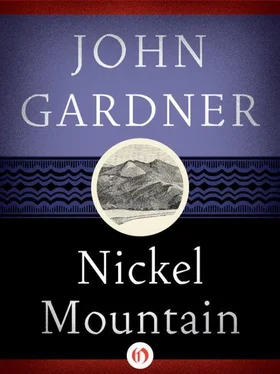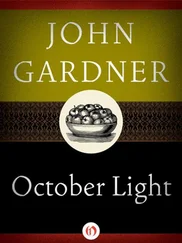He didn’t know what to think by now. Not just about the money, about the whole damn business, from the minute he’d first seen Simon Bale slumped down on the ground by his snow fence, and the people around him not moving a muscle. There was something he’d read, about a week ago: Some old man had been stabbed in New York City, it said in the paper, and there were fifteen people standing around and even when he asked them to, they never even called the police. It was hard to believe they’d all just stand there, fifteen of them, and not even one of them lift one finger, and he’d thought and thought about it. It didn’t seem natural, and he’d tried to see it from their side, because if there was any way on earth to explain it, the secret had to be in those people’s feelings. He could understand their not helping: afraid of the fellow with the knife. But to merely stand there like a herd of cows — it was past all comprehending. A man could turn into an animal, then. It was something about living in the city, that was all he could figure. And he could understand that, it came to him. He’d felt it himself one time in Utica. He’d never have believed there were that many people in all this world, especially that many poor people, burnt-out-looking; and walking in that crowd, looking at faces that stared right through him (no two faces in all that city exactly alike, each one marked by its own single lifetime of weathers, suppers, accidents, opinions), he’d felt a sudden disgust — or not even that, a calm disinterest, as though he were seeing it all with the eves of a thinking stone to whom all human life was nothing, to whom even his own life was nothing. If there were millions and millions of people in the world, they were nothing compared with the billions and billions already dead. But then he’d seen a man he knew, and he could hardly recapture, when he’d thought back to it later, that vision of people as meaningless motion, a stream of humanity down through time, no more significant than the rocks in a mountain slide. It was different in the country, where a man’s life or a family’s past was not so quickly swallowed up, where the ordinariness of thinking creatures was obvious only when you thought a minute, not an inescapable conclusion that crushed the soul the way pavement shattered men’s arches. And so they had stopped being human. It was outrageous that it could happen, but maybe it did, and, worse, maybe it was the people in New York City that were right. What was pleasant to believe was not necessarily true. Elves, for instance, or Santa Claus, or what he’d never have doubted once, the idea that Henry Soames would live practically forever. He thought: Or angels. He could remember — it seemed like centuries ago, when he was four or five — lying in bed with his grandmother, looking at pictures in the Christian Herald. It was in an upstairs room in the big old house where his parents had lived, and outside the window there were pines moaning and creaking in the summer wind. She had told him about angels, and there had seemed no possible question of its not being true. Once, standing on a hillside watching the northern lights, he had seen an angel with absolute clarity — as clearly as, another time, he’d seen a great, round frying pan in the sky when he was looking for the Big Dipper. But then the evidence against them came in, piece by piece, fact after fact, until by sheer bulk the facts overwhelmed them, and what was good to believe — for the world was vastly more beautiful with angels than it was without — was incredible. He’d been right, then, at least in this: He wasn’t acting for but against —Callie, Callie’s mother, the people who said on no earthly grounds but animal distrust that Simon had burned his own house. And maybe he had, who knew? How far would Henry Soames go on what George Loomis would call pure meanness? He thought of the money and the sinking feeling returned. He was sweating again.
He found them behind the garage. He stopped when he saw them, and neither Simon nor Jimmy looked up. Simon was sitting on a tipped-over oil drum, writing something with a pencil on a piece of wood, and Jimmy was standing at his elbow watching. Henry stopped and it came to him that, close he was, they didn’t realize yet that he was there. Jimmy was saying, “Why?” and Simon said, “Because he loves all little children, if they repent.” He spoke softly, insistently. Henry went cold all over. Jimmy said, “Who is God?” Henry said sharply, “Simon!”
The man jumped a foot, then instantly went into his obsequious cowering. He said, “H’lo.”
Henry said nothing. A muscle was jumping in his jaw, and his chest was churning so badly he could hardly get his wind. Jimmy looked up as if caught at something. At last Henry said, “The troopers would like to talk to you, Simon. In the diner.”
For a moment Simon seemed unable to make sense of the words, but then their meaning came through, and he stood up.
Henry waited with his hands behind his back, keeping his fury inside, and when Simon reached him, he turned and walked with him toward the diner. Jimmy started to follow, and Henry said, “You go back to the house.” The child opened his mouth to protest, but Henry pointed toward the house angrily and Jimmy started across the grass. By the time he reached the door he was crying.
“What were you making?” Henry asked abruptly.
Simon blushed like a child and held out the piece of wood. The letters were cut deep, like the writing on a schoolroom desk: GOD IS LOVE. Around the writing there were curlicues.
Henry said nothing. They reached the back door of the diner and Henry reached ahead of Simon to push the door open. Simon hesitated a moment, looking up at him as if in fright, and the tic played on his face; then he went in. Callie’s mother stood fussing with the mustard pots at the end of the counter.
The younger trooper had a clean-cut, Italian look. The other one was maybe fifty, a large belly but a small, lean face. They had their hats off. Simon went over to stand beside them, leaning on the counter, his suitcoat hanging down limp, the crotch of his baggy trousers low, and he waited. He looked very small, to Henry, and he stood like an old man, bent forward a little, his knees turned slightly inward. The trooper closest to him, the younger one, said, “Sit down, Simon.” Simon got up on the stool.
Henry went to the near end of the counter and stood with his arms folded, looking at the floor. His anger began to cool a little now. He’d been unfair, in a way; there was no doubt of it. It was ridiculous to fly into a rage at an old man’s teaching a child that God was Love. It was the word “repent,” maybe, that had set him off. But if so, that was more ridiculous yet. What did “repent” mean to a boy two years old? Or maybe what had done it was his finding them out there behind the garage. But he couldn’t blame Simon for that, after all. Jimmy followed him everywhere, and in fact they themselves, he and Callie, had encouraged it. Even now he felt angry, but he felt, at the same time, ashamed. Then what the trooper was saying caught his attention:
“What happened before you went to work the night of the fire?”
“Why?” Simon said. It was as if he wanted assurance that the question was important before he would trouble to remember.
“Just tell us what happened,” the other trooper said.
Simon touched his forehead with the back of his hand. “I had supper,” he said.
The younger trooper said impatiently, “We understand you had a disagreement with your wife.”
Simon looked at the man in surprise, then over at Henry. “Why, no,” he said, “no.” His smile came. Callie’s mother was standing motionless, looking out the window, and Henry felt a clutch of fear.
Читать дальше











